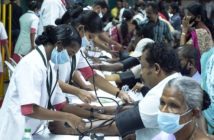The bustling streets of India’s urban landscapes mask a simmering health concern: a rising tide of gastrointestinal diseases (GIDs). From the bustling megacities of Delhi and Mumbai to the rapidly developing towns, the incidence of these illnesses is causing worry, impacting individuals, healthcare systems, and the nation’s overall health and well-being.
The Uncomfortable Reality: Facts and Figures Paint a Grim Picture
- Prevalence on the Rise: Research by the Indian Council of Medical Research (ICMR) paints a concerning picture. In 2019, over 20% of urban Indians reported experiencing at least one episode of GID in the previous year. This number is projected to rise further, fueled by rapid urbanization and lifestyle changes.
- Common Culprits: The most prevalent GIDs in urban India include:
- Acute Diarrheal Diseases: Caused by contaminated water and food, these illnesses affect millions annually. A 2020 study published in the Journal of Gastrointestinal and Liver Diseases found that 1 in 10 urban Indians experience acute diarrhea every year.
- Inflammatory Bowel Disease (IBD): This chronic condition, characterized by inflammation of the gut, is seeing a concerning rise in urban areas. A 2021 study published in the Indian Journal of Gastroenterology revealed a 5-fold increase in IBD cases in urban India over the past decade.
- Functional Gastrointestinal Disorders (FGIDs): These disorders, like irritable bowel syndrome (IBS), cause significant discomfort and are often linked to stress and lifestyle factors common in urban life. A 2022 study in the Indian Journal of Clinical Practice found that nearly 15% of urban adults suffer from FGIDs.
The Culprits at Play: Unraveling the Causes
Several factors contribute to the rise of GIDs in urban India:
- Unsafe Water and Sanitation: Inadequate access to clean water and proper sanitation facilities in many urban areas exposes residents to harmful pathogens, leading to diarrheal diseases and other infections.
- Unhealthy Food Choices: The shift towards processed, sugary, and fried foods in urban diets lacks essential nutrients and fiber, contributing to digestive issues and increasing the risk of chronic conditions like IBD.
- Stressful Lifestyles: The fast-paced, competitive environment in urban areas can lead to chronic stress, a significant risk factor for FGIDs like IBS.
- Limited Access to Healthcare: Inadequate healthcare infrastructure and a shortage of qualified gastroenterologists in many urban areas can delay diagnosis and treatment, worsening GID outcomes.
Beyond the Gut: The Impact of GIDs
The consequences of GIDs go beyond individual discomfort. They can lead to:
- Reduced Productivity: Frequent illness and hospital visits can impact work performance and productivity.
- Increased Healthcare Costs: Treating GIDs puts a strain on already stretched healthcare resources, impacting both individuals and the healthcare system.
- Nutritional Deficiencies: Chronic GIDs can hinder nutrient absorption, leading to malnutrition and other health complications.
Fighting Back: Cures and Prevention Strategies
While the situation may seem daunting, there are ways to combat the GID threat:
- Investing in Safe Water and Sanitation: Improving access to clean water and proper sanitation facilities is crucial to preventing infections and diarrheal diseases.
- Promoting Healthy Eating Habits: Encouraging consumption of fresh fruits, vegetables, and whole grains while reducing processed food intake can improve gut health and reduce GID risks.
- Stress Management Techniques: Practicing yoga, meditation, and other stress-reduction techniques can alleviate symptoms of FGIDs and improve overall well-being.
- Strengthening Healthcare Infrastructure: Increasing the number of qualified gastroenterologists and improving access to diagnostic and treatment facilities are critical for timely and effective GID management.
A Collective Effort for a Healthier Gut
Urban India’s GID challenge requires a multi-pronged approach. Individuals, healthcare professionals, and policymakers must work together to promote preventive measures, improve healthcare access, and invest in sustainable solutions. By prioritizing gut health, we can pave the way for a healthier, more productive urban population and a brighter future for India.
Remember: This article is not intended as a substitute for professional medical advice. Always consult with a qualified healthcare provider for diagnosis and treatment of any gastrointestinal issues.






